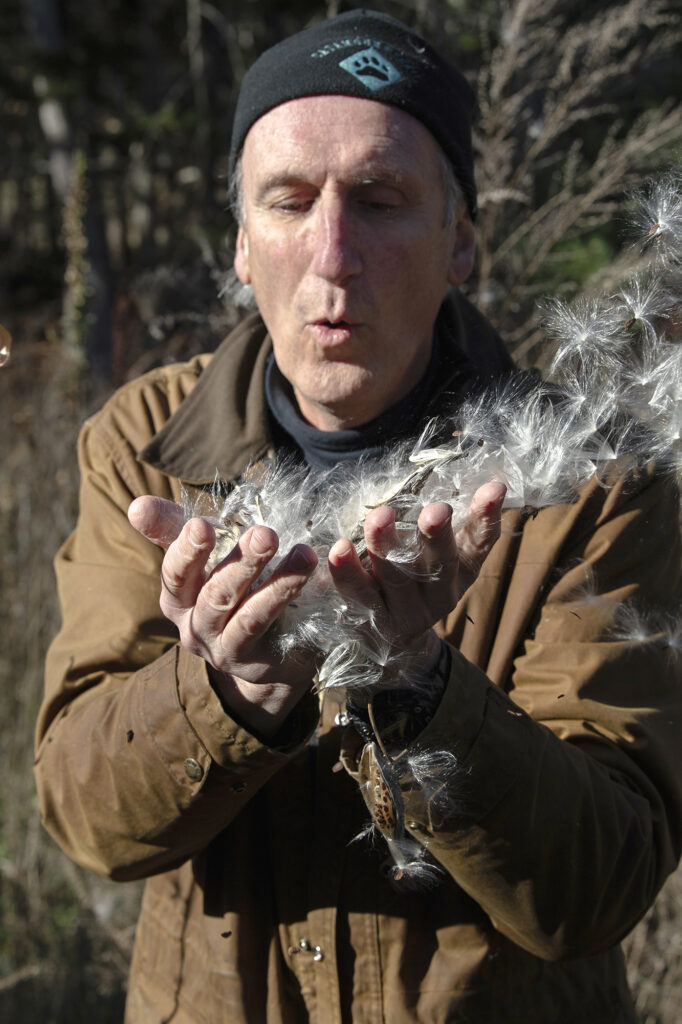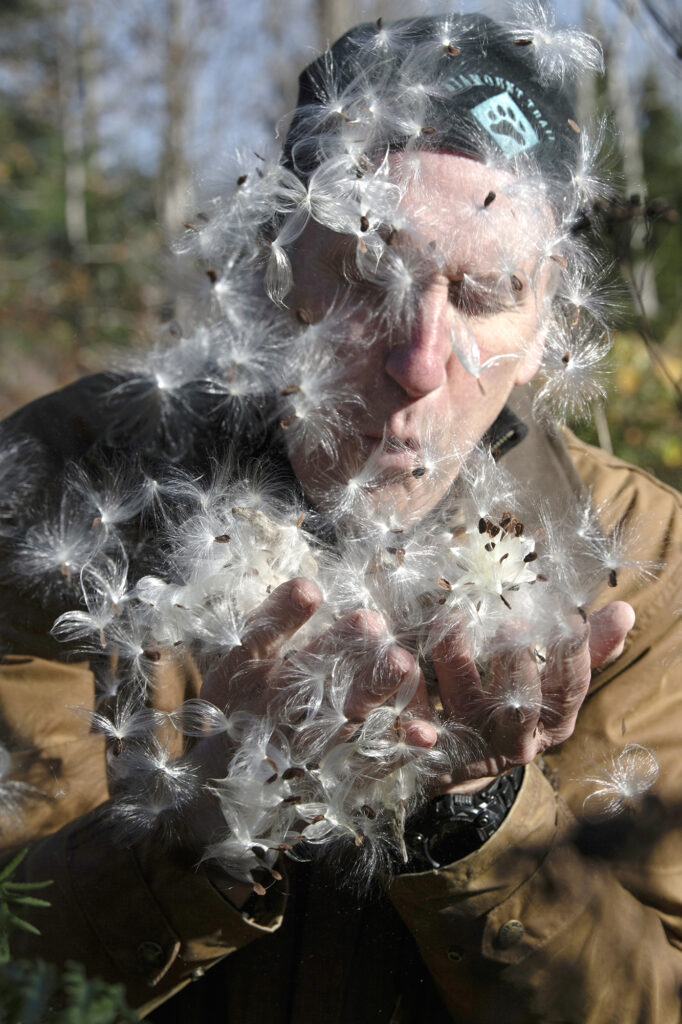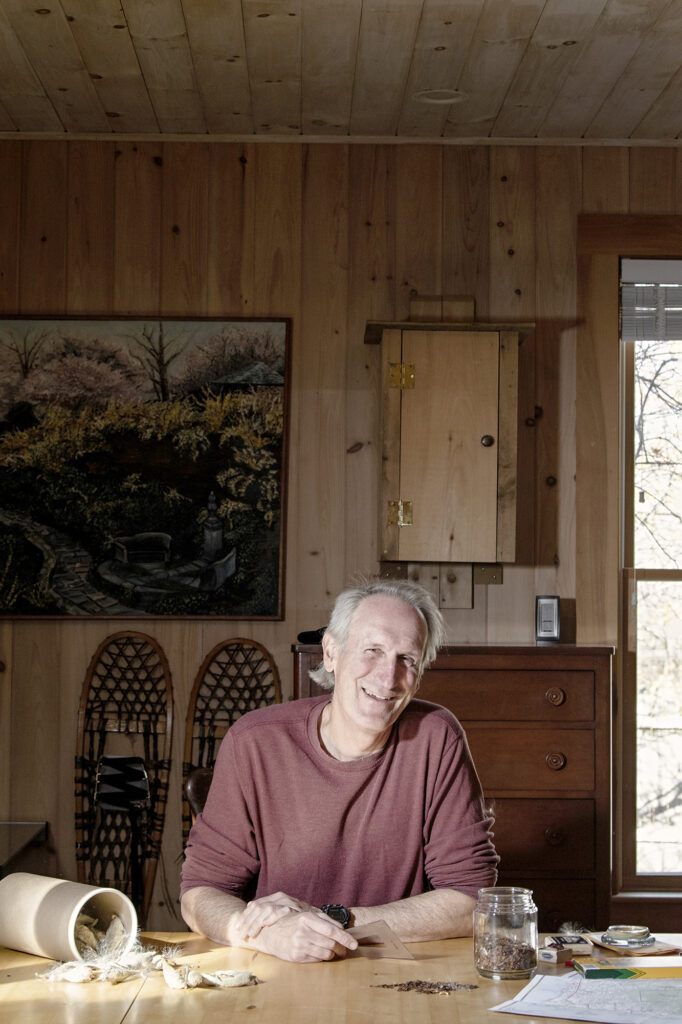Milkweed Man
Peaks Island’s Steve Bushey has been called a lot of things: Steve, Steven, Steve the Cartographer, and for folks who need further explanation, Steve the Professional Mapmaker. He and his wife, Angela Faeth, are the founders of Map Adventures, and chances are, if you’ve climbed Mount Katahdin or hiked anywhere in Acadia (or New Hampshire, Vermont, New Mexico, or Northern California), you’ve held their maps in your hands. And while cartography continues to be Bushey’s “dream job”—for his master’s thesis in geography, when he was just 24 years old, he founded and mapped the Catamount Trail, a cross-country ski trail that runs the length of Vermont—this cartographer/geographer/outdoor travel tourism expert has taken on a new nickname: Maine’s Johnny Appleseed of Milkweed. Since last summer, Bushey, now in his mid-60s, has had boots on the ground, mapping, harvesting, planting, and protecting milkweed—the required plant host and meal of choice for monarch butterfly larvae—in hopes of saving these vital insects, one seed at a time.


How did milkweed become such an important part of your life?
This past midsummer I read a story about the incredible journey the monarchs make during their migration from the mountains of Mexico to the eastern points of New England, some flying up to 3,000 miles. So, being a mapmaker, I really drilled down on that. I went online and looked at a whole bunch of maps, and I found where the preserves were. I had in my mind where they fly to, but then I started reading that their flight patterns are being challenged by urbanization, suburbanization, and the use of herbicides, which kills a lot of the plants that they need. Monarchs are pollinators, and our planet needs pollinators to survive. It became very clear, very fast that monarchs need milkweed to reproduce.
There is a great volunteer-based organization called Monarch Watch, and they talk a lot about how people can help propagate and spread milkweed. I kind of got roped into this magical, mystical idea of a monarch. And I thought, wow, this is something that anyone can do. “Milkweed for the monarchs.” That became my little mantra.
I started walking around Peaks with my GPS, looking for milkweed. I made a base map of the island and spent probably every morning for a month systematically looking on every trail, every corner, every road. I lost about 12 pounds because I was walking so much. I mapped 60 different locations, finding that most of the milkweed was in people’s gardens. Milkweed is a very important component of a pollinator garden. Then I thought, okay, I can collect milkweed [seed] and dry it out and propagate it, spread it around. Also when I was walking around, I started telling people what I was doing, and people started dropping off milkweed in my mailbox, bringing me milkweed pods. Everyone loves to talk about their gardens, so it was very easy to get people to tee off on the subject. Most people just want pretty flowers, and far fewer people plant pollinator gardens. But we need some intent behind what we plant, and educational intent.

“If you don’t have pollination, you don’t have life.”
Can you explain milkweed’s vital importance to the health of our planet?
Milkweed has a toxin in it, and when a caterpillar eats the leaves, their body absorbs that toxin, and other bugs and predators don’t like the taste of it. The milkweed toxin is a caterpillar’s defense against predators. The bright colors of the butterfly advertise that “I don’t taste good, so leave me alone.” There are over 30 different types of milkweed in North America, and in the eastern United States, like Maine and northern New England, there are two primary types of milkweed: common milkweed and swamp milkweed, which, as you might imagine, grows in wetter areas. What I’ve harvested on this island is common milkweed. The whole reason I have an interest in this is to help protect the pollinators because they are dying. And if you don’t have pollination, you don’t have life.
What happens with the harvested seeds?
On their own, the seeds are only going to blow so far. If someone has a garden and the garden is surrounded by two acres of mowed lawn, the seeds are not going to find any place because they need disturbed soil. They need a place to lodge themselves. Americans love mowed lawns, and they’re sterile deserts really, where not much grows. Anyone can plant harvested seeds. People have gardens, and if everyone started planting milkweed and other native flowers, that would really help the butterflies. When the butterflies hatch or crawl out of their chrysalis, they need food, so having flowers in bloom in September and early October is really important. Pollinator gardens serve not only the butterflies and the monarchs; they also serve other insects, and insects are the animals that power our world.

What do you love the most about your new mission?
The choreography. It is performance art in activism, a dance. First, you identify the location of the milkweed. You collect it. You have to ask permission, because a lot of the milkweed will be in people’s gardens, meaning you have to have a conversation with someone, which often can be very positive. You dry the seeds. In my case, I dry them upstairs in the loft of the studio where it’s warm and dry. Then you crack open the pods and perhaps create little seed packets. You can distribute them or plant them yourself, or you can give seed packets to your friends and your friends can spread them, and your garden friends can plant it. It’s another opportunity for you to stand on your stage or your little soapbox and do a show, tell, and sell. You’re telling a story, and hopefully you’re giving your story to someone else, and they can make that story their own. Anyone and everyone can do this. And I think that’s a great way for all of us to save a little bit of our environment and help the planet be healthier.
Read More:
- Milkweed Man

- A Stitch in Time

- Saltwater Classroom Uses Tech to Teach Ocean Conservation

- This Go-To Ice-Fishing Tool was Invented in Maine
- A Q&A with “Best American Essays 2022” Guest Editor Alexander Chee


